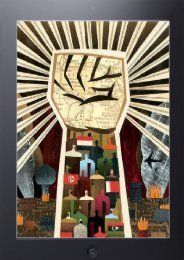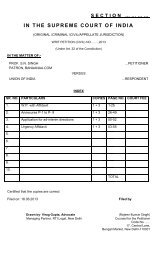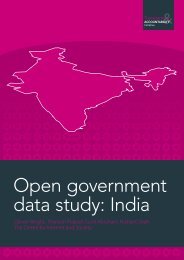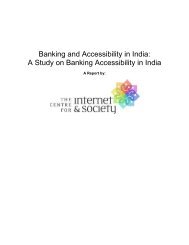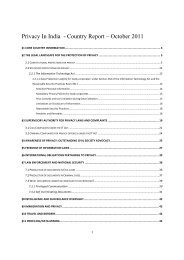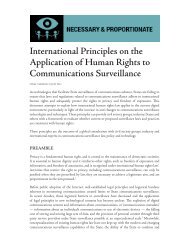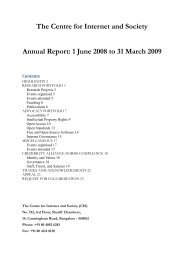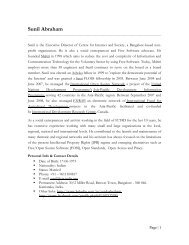Open Access to Scholarly Literature in India - Centre for Internet and ...
Open Access to Scholarly Literature in India - Centre for Internet and ...
Open Access to Scholarly Literature in India - Centre for Internet and ...
You also want an ePaper? Increase the reach of your titles
YUMPU automatically turns print PDFs into web optimized ePapers that Google loves.
There are other far more fundamental considerations <strong>to</strong>o. It is not just researchers who<br />
need access <strong>to</strong> research <strong>in</strong><strong>for</strong>mation. Teachers <strong>and</strong> students wish<strong>in</strong>g <strong>to</strong> make the class<br />
lively, doc<strong>to</strong>rs, patients <strong>and</strong> their families seek<strong>in</strong>g medical <strong>in</strong><strong>for</strong>mation, small<br />
bus<strong>in</strong>esses look<strong>in</strong>g <strong>for</strong> product <strong>and</strong> process-related <strong>in</strong><strong>for</strong>mation, <strong>and</strong> the lay public<br />
generally <strong>in</strong>terested <strong>in</strong> late <strong>in</strong>ternational developments <strong>in</strong> science are also unable <strong>to</strong> af<strong>for</strong>d<br />
access <strong>to</strong> such <strong>in</strong><strong>for</strong>mation much of which is produced with taxpayers' money. If, as Nobel<br />
Laureate Joseph Stiglitz argues, knowledge is a global public good that is central <strong>to</strong><br />
successful development, then the <strong>in</strong>ternational community has a collective responsibility<br />
<strong>for</strong> the creation <strong>and</strong> dissem<strong>in</strong>ation of knowledge <strong>for</strong> development. 47 But there is an <strong>in</strong>creas<strong>in</strong>g<br />
tendency <strong>to</strong> privatize knowledge <strong>and</strong> strengthen <strong>in</strong>tellectual property regimes.<br />
Here is what Arun Narasimhan of IIT Madras says: “As a researcher, I do all the hard<br />
work, th<strong>in</strong>k of an idea, f<strong>in</strong>d the research methods <strong>and</strong> <strong>to</strong>ols, f<strong>in</strong>d the fund<strong>in</strong>g if necessary<br />
<strong>to</strong> accomplish certa<strong>in</strong> tasks <strong>to</strong> realize the idea <strong>and</strong> see its merit, write the results us<strong>in</strong>g the<br />
idea <strong>and</strong> analyze the pros <strong>and</strong> cons of the idea <strong>and</strong> send that research article usually <strong>to</strong> a<br />
research journal office compris<strong>in</strong>g of other researchers. The subsequent peer review<br />
process that qualifies my idea <strong>for</strong> its worth<strong>in</strong>ess as orig<strong>in</strong>al useful scientific knowledge is<br />
done by these academics <strong>and</strong> researchers mostly <strong>for</strong> no fee. It is a service they all must<br />
per<strong>for</strong>m because it will be reciprocated <strong>in</strong> k<strong>in</strong>d <strong>and</strong> quality by other researchers <strong>in</strong> the<br />
community <strong>to</strong> uplift their research work. Strict but free of money. … But the actual publish<strong>in</strong>g<br />
of the entire body of research knowledge is done by publishers, the middlemen,<br />
(<strong>and</strong> it is they) who control entirely the key aspects like who could have access <strong>to</strong> such<br />
knowledge, how much profit the publishers could make, what sort of copyright the researcher<br />
who generates orig<strong>in</strong>al knowledge could have <strong>and</strong> so on.” 48<br />
Every <strong>in</strong>novation makes use of previously accumulated knowledge — it draws on the<br />
global commons of pre-exist<strong>in</strong>g knowledge. This issue of the use of the global<br />
knowledge commons has been brought home <strong>for</strong>cefully <strong>in</strong> the context of bio-diversity,<br />
where private firms have prospected <strong>for</strong> valuable drugs <strong>in</strong> natural sett<strong>in</strong>gs <strong>in</strong> develop<strong>in</strong>g<br />
countries. 49 Countless numbers of plants used <strong>in</strong> traditional medical systems of <strong>India</strong>,<br />
Ch<strong>in</strong>a, Africa <strong>and</strong> Lat<strong>in</strong> America have been drafted <strong>in</strong><strong>to</strong> the western medical system<br />
through knowledge acquired from local people. Western pharmaceutical companies take<br />
away <strong>to</strong>nnes of plant material from these regions but the local people get hardly any<br />
47<br />
Stiglitz J E (1999), ‘Knowledge as a Global Public Good' <strong>in</strong> Global Public Goods: International Cooperation<br />
<strong>in</strong> the 21st Century, edited by Inge Kaul, Isabelle Grunbuerg <strong>and</strong> Marc A Stern, published <strong>for</strong><br />
UNDP by Ox<strong>for</strong>d University Press, New York, 308-325.<br />
http://www.undp.org/globalpublicgoods/TheBook/globalpublicgoods.pdf#page=346.<br />
48<br />
Narasimhan A (2008), <strong>Open</strong> <strong>Access</strong> Publish<strong>in</strong>g, nOnoScience,<br />
http://www.nonoscience.<strong>in</strong>fo/2008/02/20/open-access-publish<strong>in</strong>g/.<br />
49 Supra note 38.<br />
Page | 21



